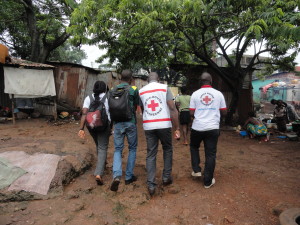“Ebola is a lie”: The Guinean Red Cross’ costly fight against Ebola -- and locals
 Despite good intent, the fight against Ebola in Guinea and other surrounding nations is often twice as difficult for Red Cross Aid workers who find themselves trying to combat a poignantly lethal virus, as well as misinformed local villagers who simply do not believe in the reality surrounding this virus and the fact that Health Workers are there to help. Since Red Cross workers begun work in Guinea, their workers have been victim to approximately 10 attacks a month. The most recent of these attacks took place two Sundays ago when two Guinean Red Cross volunteers were attacked and beaten by local residents while performing a burial of Ebola victims. In 2014 alone, eight workers were killed while trying to performing very similar work, making these efforts increasingly difficult and dangerous for Red Cross workers.
Despite good intent, the fight against Ebola in Guinea and other surrounding nations is often twice as difficult for Red Cross Aid workers who find themselves trying to combat a poignantly lethal virus, as well as misinformed local villagers who simply do not believe in the reality surrounding this virus and the fact that Health Workers are there to help. Since Red Cross workers begun work in Guinea, their workers have been victim to approximately 10 attacks a month. The most recent of these attacks took place two Sundays ago when two Guinean Red Cross volunteers were attacked and beaten by local residents while performing a burial of Ebola victims. In 2014 alone, eight workers were killed while trying to performing very similar work, making these efforts increasingly difficult and dangerous for Red Cross workers.
Due to mistrust between health workers and residents, it is a common belief among Guineans that those very same workers who often come to disinfect areas, bury the dead, and dispel myths, are actually there to further spread the disease, leading to the ongoing insults and assaults that some of these workers experience while working in the region. The president of the Guinean Red Cross, Youssouf Traore believes -- and many agree -- that “Ebola cannot be stopped until people change their false perceptions and outlooks about the disease.”
As well as performing all of the routine sanitary tasks of proper burial and disinfections, the Red Cross, and the country in general cannot effectively suppress this disease in the long run if they do not start to properly educate people and dispel the myths surrounding the disease. Dispelling these myths should be just as much of the fight as the actual burials and disinfections because not only could it save the lives of aid workers, but it also promotes a pattern of self-help where an informed population can begin to carry out the practices and habits necessary to limit the spreading of this disease.
Just this past September, six red cross workers were attacked while trying to collect the body of a person who was suspected to be infected by the disease. These attacks were only a week removed from another instance where eight corpses including those of health workers and 3 journalists were found in a village latrine in southeastern Guinea. These eight people were killed in cold blood on the 16th of September and found two days later.
Convincing local communities that health workers are on their side is a challenging task, especially when there is no prior relationship of trust to rely upon. To do this, the Guinean Red Cross has since September of last year, tried to shift from organizing massive social mobilizations, as was the case at the beginning of the outbreak to introducing more effective community engagement efforts, which focus on educating smaller communities on the myths and facts of the disease, and how they can contribute to the Red Cross’s efforts and increase their own chances of survival in the process. Unfortunately the message brought by these community health workers is often not welcomed; neither is their presence, as they continually encounter villagers who simply believe that “Ebola is a lie” and that the disinfectant sprays that health workers often spray at funerals are in fact the virus itself.
So far in 2015, the number of attacks on health workers has been relatively low until these recent ones. Unfortunately, this comes at a time when international aid in the fight seems to be waning. For example, of the 2,800 troops sent to the West Africa at the height of this epidemic, only about 1,100 remain today. And in a recent statement made just two weeks ago by President Barack Obama, the U.S. plans to only have about 100 soldiers remaining in the region by April. This is partly because great progress has been made in the fight against this disease. What is needed from here on out is precisely what Guinean Red Cross President Traore has mentioned: community-focused engagement and education that can help build trust between locals and health workers, as well as increase overall awareness about the disease.
